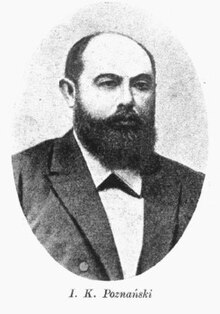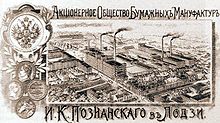Izrael Poznański
Izrael Kalmanowicz Poznański jid. ישראל פאזנאנסקי (born August 25, 1833 in Aleksandrów , Congress Poland ; † April 28, 1900 in Łódź ) was a Polish-Jewish philanthropist , businessman and manufacturer.
biography
Izrael Poznański, from the town of Kowal (now the Kujawy-Pomeranian Voivodeship in Poland), was the grandson of the grocer Izaak and the youngest son of the merchant Kalman (officially recorded as Poznański) and his mother Małka Lubińska. In 1825, 40-year-old Kalman Poznański settled in Aleksandrów Łódzki (near Łódź) with his wife, children and domestic servants. One year after the birth of Izrael (1834) the family, as one of the wealthier ones, moved a second time, this time from Aleksandrów Łódzki to Łódź. There the father acquired the right to trade in textile goods, including cotton and linen. He was also the first to build a multi-storey apartment building in the old town , in which his spice and textile shop was located.
In Łódź, Izrael Poznański graduated from elementary school and the Progymnasium. It was there that the future multimillionaire learned the basics of entrepreneurship. As a youth he collected old fabrics by driving around in a rickety wagon pulled by an emaciated horse (later those who were jealous claimed that he had not horses but dogs harnessed to the wagon). When he was seventeen, he married Leoni Hertz, daughter of Moses Hertz, a wealthy Warsaw merchant. In the marriage contract he was referred to as a "master weaver", who brought a factory worth five hundred rubles into the marriage, his wife in return, a shop with yard goods in Warsaw.
In December 1852, Izrael Poznański took over his father's specialty shop and systematically expanded it: in 1859 his company produced goods worth 6,000 rubles, in 1868 the value rose to 23,000 rubles. Between 1871 and 1892 he bought land on Ogrodowa Street to build large industrial plants there. The first thing that was established there in 1872 was a machine-operated weaving mill with 200 looms .
In the following years there was a rapid expansion:
- 1874/75 - enlargement of the weaving mill
- 1877 - Construction of a large cotton mill
- 1878 - in-house workshops
- 1880 - the factory's own hospital on Drewnowska Street (formerly Szpital Św.Józefa, today Radliński Hospital)
- 1885–1890 - The Jewish Hospital, now the University Hospital on Sterling Street
- 1887 - dye works, central boiler house
- 1890, 1895 - further weaving mills
- 1893 - iron foundry
- 1895–1897 - large cotton warehouses near the Old Cemetery
On October 29, 1889, Poznański's company, like other cotton companies at the time, was converted into a joint stock company. The official name of the company was IK Poznański Joint Stock Company for Cotton Goods in Lodz . The number of employees in his company grew over the years: 1865 - 70 workers, 1879 - 426 workers, in 1906 the average number of employees was 6800.
Against the background of deteriorating working conditions, there was a workers' strike in 1883. The working day at that time was 16 hours, from 5 a.m. to 9 p.m., and a new regulation came into force, according to which work was also compulsory on public holidays. The new regulation should come into force on August 15, on the Assumption of the Virgin . Failure to comply with the order could result in a fine of 3 rubles. The police and the Cossack army put down the strike and violently led away 50 workers. In February 1884 Poznański imposed fines on those who protested against the work on Candlemas . He hit one of the workers. In 1891 the representative of the factory inspector reported that the salaries paid in Poznański's factories were the lowest in all of Łódź, while the fines there were the highest. During the six-day strike in 1892, the factory office was converted into an investigative office, where the strikers were humiliated and beaten so that they could be removed from the factory without showing evidence of guilt.
Izrael Poznański had four sons (Ignacy, Herman, Karol and Maurycy) and two daughters (Anna (Ajdla), married to Jakub Hertz , and Joanna Natalia, married to Zygmunt Lewiński ).
Izrael died on April 29, 1900 and was buried in the family grave in the New Jewish Cemetery in Łódź. In the year of his death, his fortune was 11 million rubles. However, the First World War brought his company great losses. The following generations managed the company until the 1930s, after which the Banca Commerciale Italiana (today part of Intesa Sanpaolo ) took over the indebted company. Poznański's résumé shows a radical change. At first he was considered a ruthless employer who did not care about the safety of his workers. Numerous serious or even fatal accidents occurred in his factories. As he got older he started to get involved in charities: he built orphanages, schools for children from poor families and hospitals.
The figure of Max 'Aszkenazy from the novel Di brider Ashkenasi by Israel Joschua Singer is based on Izrael Poznański. According to some sources, this also applies to the character of Moritz Welt from Władysław Reymont's novel The Promised Land .
The Poznański Palace in Łódź, which houses the Museum of the History of the City of Łódź , and the family’s old textile factory are still worth seeing today . The site of the textile factory was redesigned and the Manufaktura shopping center has been located there since 2006 .
literature
- Skrzydlo, Leszek: "Rody fabrykanckie". - Łódź, 1999.
- Skrzydlo, Leszek: "Rody fabrykanckie II". - Łódź, 2000.
Web links
- http://www.uml.lodz.pl/wersja_angielska/indeksik.php3?zapytanie=2,01,02,18
- http://w3.am.lodz.pl/ld/Poznanski/p1.html
Individual evidence
- ↑ Alan Jakman: "Król bawełny" - Izrael Poznański. More maiorum.
- ^ Adam Próchnik, Studia i szkice (1864–1918), wyboru dokonał Krzysztof Dunin-Wąsowicz, Warszawa 1962, s. 361.
- ↑ Feliks Perl, Dzieje ruchu socjalistycznego w zaborze rosyjskim, Tom I, Warszawa 1910, s. 160.
- ^ Adam Próchnik, Studia i szkice (1864–1918), wyboru dokonał Krzysztof Dunin-Wąsowicz, Warszawa 1962, s. 368.
- ↑ Feliks Perl, Dzieje ruchu socjalistycznego w zaborze rosyjskim, Tom I, Warszawa 1910, s. 330
- ↑ http://www.polityka.pl/tygodnikpolityka/historia/1509750,1,potomkowie-izraela-poznanskiego.read
| personal data | |
|---|---|
| SURNAME | Poznański, Izrael |
| ALTERNATIVE NAMES | Poznański, Izrael Kalmanowicz |
| BRIEF DESCRIPTION | Polish philanthropist and businessman (manufacturer) |
| DATE OF BIRTH | August 25, 1833 |
| PLACE OF BIRTH | Aleksandrów , Congress Poland |
| DATE OF DEATH | April 28, 1900 |
| Place of death | Łódź |

